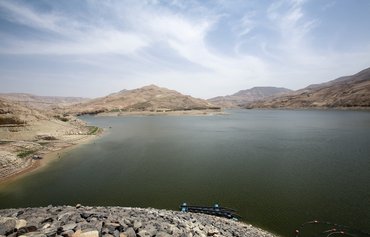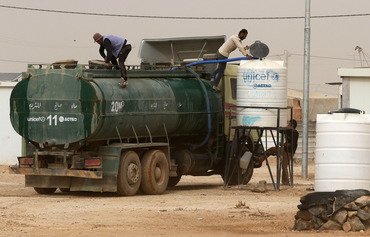During a high-level meeting on the sidelines of the UN General Assembly, Jordan renewed its call to the international community to help it meet its growing demand for water which has been exacerbated by the influx of Syrian refugees.
Jordan is one of the world's poorest countries in terms of water resources, Minister of Planning and International Co-operation Imad Fakhoury said during a September 25th meeting co-chaired by UN Secretary-General Ban Ki-moon and World Bank president Jim Yong Kim.
The kingdom's water supply per capita is 88% below the international water poverty line of 1,000 cubic metres annually, he said.
The problem is exacerbated as Jordan is hosting about 2.8 million refugees registered with the UN High Commissioner for Refugees (UNHCR) and the UN Relief and Works Agency for Palestinian Refugees in the Near East (UNRWA).
Of these, about 1.4 million are Syrians, roughly 600,000 of whom are registered with UNHCR.
The water problem in Jordan is a key national issue, Fakhoury said, noting that Jordan's water resources are among the lowest in the world.
The influx of refugees fleeing Syria's war has increased the demand for water and placed significant pressure on the water system, he added.
Fakhoury called for a strong partnership to be established for the sustainable management of water and sanitation facilities between governments, the private sector and civil society organisations, with technical support from the UN.
Projects in the pipeline
"The massive number of refugees significantly increased demand for water," Ministry of Water and Irrigation spokesman Omar Salameh told Al-Mashareq.
This has forced the ministry to implement several projects to meet demand, he said, adding that new projects will be implemented in the near future as part of a government plan to address this issue.
The annual per capita cost of each refugee to the Jordanian government is more than 350 Jordanian dinars ($493.55), he said, a figure that includes the cost of water and sanitation services.
Areas hosting large numbers of refugees have seen demand for water increase by up to 22%, he said, with the kingdom's northern provinces, which are most affected by the influx of refugees, seeing demand rise by up to 40%.
The ministry has been co-ordinating with international bodies to improve the water supply to the northern desert region and areas along the Syrian border, Salameh said.
"The ministry has begun implementing a plan to rehabilitate a number of wells and drill new water wells in many regions in the kingdom," he added.
Other projects include the rehabilitation of a number of desalination plants and improvement of the water network in several provinces, in addition to significant amount of maintenance work, he said.
'Not enough'
The influx of more than 150,000 Syrian refugees into Jordan's Mafraq province "has led to the disruption of water supply in some cases", local resident Suleiman Jabr told Al-Mashareq.
"We received the Syrian refugees and opened our homes to them, despite the difficult economic circumstances," he said, adding that the province had an existing water shortage which was exacerbated by the arrival of the refugees.
Water is supplied to homes once or twice a week, Jabr said, but the quantities are insufficient and the supply is frequently interrupted, especially during the summer months.
Some households have been forced to buy water from water tankers, he said, calling for international support to help Jordan address this critical issue.
Syrian refugee and mother of four Manal Alwan, who lives in Jordan's Zaatari refugee camp, said she hopes there will be sufficient water in the camp.
"I am forced to walk a long distance to fill water bottles and still the water is not enough," she told Al-Mashareq. "We know that water in Jordan is in short supply, and the world must help us in this matter."

![A Syrian boy fills water jugs in Jordan's sprawling Zaatari refugee camp. [Photo courtesy of UNHCR Jordan]](/cnmi_am/images/2016/10/11/6305-Jordan-zaatari-camp-600_384.jpg)





